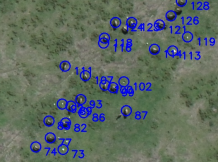Articles

Keeping track of the Serengeti's wildebeest population. Image courtesy of Colin Torney, Centre for Mathematics & the Environment.
Flies, sandflies and statistics
The ESI will be hosting the National Centre for Statistical Ecology (NCSE)’s Summer Workshop 2015, from June 29 to July 1.
The NCSE is a joint research centre, spanning a number of institutions. Its focus is on developing, applying and communicating innovative statistical methods for collecting and analysing ecological data, with the aim of improving the understanding and management of wild populations and their environment.
The NCSE was established in 2005 as a joint research centre between the Universities of Kent, Cambridge and St Andrews. In 2010, it was expanded to include the Universities of Bath, Bristol, Exeter, Glasgow and Sheffield, together with the Centre for Ecology and Hydrology, although the University of Cambridge dropped out, following departure of staff. This expansion was achieved with the aid of a joint EPSRC/NERC grant.
In addition to these universities, the NCSE comprises four other partners: Biomathematics and Statistics Scotland, the Centre for Environment, Fisheries and Aquaculture Science, the Game and Wildlife Conservation Trust, as well as Marine Scotland.
On the workshop’s first two days, delegates will have the chance to share innovative research practices via presentations every 20 minutes. The centre is constantly broadening its expertise and activities. Active areas of research include modelling population dynamics, animal movement models, metapopulation models, community models, distance sampling, mark-recapture, biodiversity monitoring, random effects models in ecology, modelling ecological point process data, and parameter redundancy in ecological models. The impact such research can have on population analysis studies (in this case, of cotton-top tamarin monkeys in Colombia) is explained in this video.
The event’s final afternoon will feature a workshop given by Dr Janine Illian, a senior lecturer from one of the organisation’s founding institutions, St Andrew’s, assisted by Charlotte Jones-Todd and Esther Jones.
Professor Stuart Townley, Chair in Applied Mathematics in the ESI, who is helping to organise the event, said: “This is a fantastic opportunity to learn about new statistical approaches being developed by members of NCSE and for NCSE to draw inspiration from the diverse range of ecological questions being studied on the Penryn Campus.”
Date: 22 June 2015
